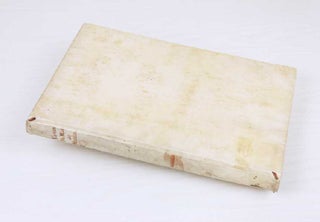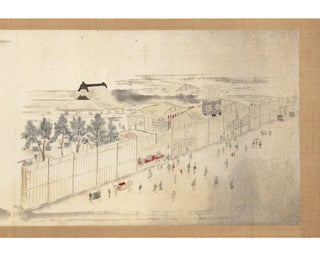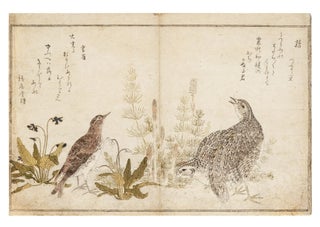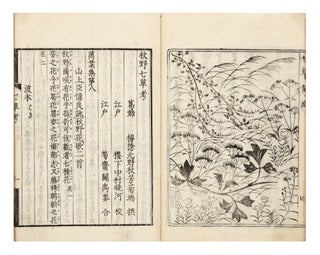“Six Martyred Subjects”
Manuscript on paper, written in Chinese, entitled on upper wrapper: “Yuksinjŏn, pu Pak T’ae-bo jŏn” or “Yuksinjeon, bu Pak Tae-bo jeon” 六臣傳附朴泰輔傳 [“Biographies of the Six Subjects, with Pak T’ae-bo’s Biography in Appendix”].
20 folding leaves. Small 4to (207 x 188 mm.), orig. semi-stiff wrappers (wrappers somewhat soiled & marked). [Korea: 18th or 19th century].
This manuscript contains biographies of six Chosŏn officials involved in a failed plot to intervene in the royal succession by regicide.
That candle burns indoors,
to whom has it bidden farewell?
While its outside drips with tears,
does it not know that its heart burns?
I also, my King left a thousand leagues back,
I burn inside and I weep.
Thus reads, in Richard Rutt’s translation, a poem by Yi Kae 李塏 (1417-56), one of the “Six Martyred Subjects” (sayuksin). These were six distinguished scholar-officials who died — by execution or by their own hands — while trying to restore the boy king Tanjong (1441-57) to the throne after his usurpation by his uncle, known to history as King Sejo of Chosŏn. Yi Kae’s biography is the second one included in our manuscript, preceded by that of his peer, the Confucian scholar Pak P’aeng-nyŏn 朴彭年 (1417-56). The other martyrs were Sŏng Sam-mun, Ha Wi-ji, Yu Ŭng-bu, and Yu Sŏng-wŏn.
Tanjong had ascended to the Korean throne upon the untimely death of Munjong, who had reigned for only two years. Munjong and Sejo were both sons of King Sejong — sometimes styled “the Great” — a monarch credited with the invention of the Korean alphabet. After Sejo deposed his nephew Tanjong, the future martyrs conspired to have Sejo murdered at a banquet for a visiting envoy from Ming China. The plot, however, was betrayed before it was put into motion. Instead, it was the six subjects who went to their deaths, along with the deposed and banished Tanjong, as well as “possibly eight hundred or more” individuals.
As indicated by the epithet “Six Martyred Subjects,” the dead officials enjoyed great respect in later Korean history. Their loyalty to their king — allegedly Yi Kae, when “tortured and the branding irons cooled off a little…told the executioners to reheat them” — was revered as a great Confucian virtue, and “a body of folk-lore grew up around the history of the period and fact soon came to be colored by fancy.” Only a close reading of our manuscript could reveal to what extent it is fact or fancy, but it seems safe to say that its existence reflects the enduring interest in the six martyrs. Numerous shrines were erected in their memory, and the story of the “Six Martyred Subjects” has often been dramatized in literature and TV series (including the first North Korean TV drama shown in South Korea).
The book carries the seal of Japanese psychologist Kuroda Ryo (1890-1947). Kuroda was appointed in 1926 to an assistant professorship at Keijo Imperial University in Seoul (Korea was at this time a Japanese colony). He remained at that university until 1942. Perhaps he acquired the manuscript during this period.
Fine copy.
References
Park, Eugene Y. A Genealogy of Dissent: The Progeny of Fallen Royals in Chosŏn Korea. Stanford: Stanford University Press, 2019.
Rutt, Michael, ed. & trans. The Bamboo Grove: An Introduction to Sijo. Ann Arbor: University of Michigan Press, 1998.
Seth, Michael J. A Concise History of Korea from Antiquity to the Present. Lanham: Rowman & Littlefield.
Price: $4,500.00
Item ID: 8832

![Item ID: 8832 Manuscript on paper, written in Chinese, entitled on upper wrapper: “Yuksinjŏn, pu Pak T’ae-bo jŏn” or “Yuksinjeon, bu Pak Tae-bo jeon” 六臣傳附朴泰輔傳 [“Biographies of the Six Subjects, with Pak T’ae-bo’s Biography in Appendix”]. PU PAK T’AE-BO JŎN YUKSINJŎN.](https://jonathanahill.cdn.bibliopolis.com/pictures/8832.jpg?width=768&height=1000&fit=bounds&auto=webp&v=1678892666)
![Manuscript on paper, written in Chinese, entitled on upper wrapper: “Yuksinjŏn, pu Pak T’ae-bo jŏn” or “Yuksinjeon, bu Pak Tae-bo jeon” 六臣傳附朴泰輔傳 [“Biographies of the Six Subjects, with Pak T’ae-bo’s Biography in Appendix”].](https://jonathanahill.cdn.bibliopolis.com/pictures/8832_2.jpg?width=320&height=427&fit=bounds&auto=webp&v=1678892666)
![Manuscript on paper, written in Chinese, entitled on upper wrapper: “Yuksinjŏn, pu Pak T’ae-bo jŏn” or “Yuksinjeon, bu Pak Tae-bo jeon” 六臣傳附朴泰輔傳 [“Biographies of the Six Subjects, with Pak T’ae-bo’s Biography in Appendix”].](https://jonathanahill.cdn.bibliopolis.com/pictures/8832_3.jpg?width=320&height=427&fit=bounds&auto=webp&v=1678892666)



